Pacific parrotlet
| Pacific parrotlet | |
|---|---|
 | |
| In El Oro Province, coastal SW Ecuador | |
| Scientific classification | |
| Kingdom: | Animalia |
| Phylum: | Chordata |
| Class: | Aves |
| Order: | Psittaciformes |
| Family: | Psittaculidae |
| Genus: | Forpus |
| Species: | F. coelestis |
| Binomial name | |
| Forpus coelestis (Lesson, 1847) | |
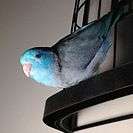
The Pacific parrotlet (Forpus coelestis), also known as Lesson's parrotlet or the celestial parrotlet, is a species of small parrot in the family Psittacidae, native to Ecuador and Peru. Its natural habitats are subtropical or tropical dry forest, subtropical or tropical moist lowland forest, subtropical or tropical dry shrubland, and heavily degraded former forest.
Parrotlets are the second smallest group of all parrots. Pacific parrotlets are between 4 1⁄2 to 5 1⁄2 inches (110 to 140 mm) long. The average weight is 34–44 grams (1.2–1.6 oz) in the wild. They come from the South American countries of Peru and Ecuador. There are seven species of parrotlets in the genus Forpus. Only three of these species are kept as pets. Of these, the Pacific parrotlet is the most common.
Description
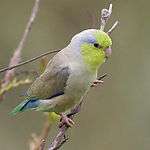
The Pacific parrotlets have olive green and grey bodies and lighter blue streaking back from their eyes. It is a dimorphic species. The males have a striking cobalt rump with blue patches on the underside of their wings and lighter yellowish green faces. Females are mostly green with much less brightly colored blue patches behind the eyes and no cobalt rump or blue in their wings. These dimorphic color variations are true of most of the color mutations as well. They are from 10–14 centimetres (3.9–5.5 in) long.
Aviculture
This species is not very common in pet stores in the USA and is valued by breeders. Its normal price range is 150-200 USD. This price is much lower than other species because since 1930 the US has had an established breeding population in captivity, before the CITES laws preventing importing wildlife from foreign countries. Some of the color mutations in aviculture include blue, American yellow, American White, European yellow and white, fallow, dark factor green and lutino. Captive bred Pacific parrotlets can be expected to live between 10 and 15 years with good care and regular veterinary examinations, although individuals may have shorter or longer life spans.

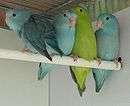

.jpg)
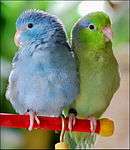
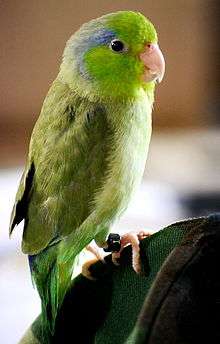
References
- ↑ BirdLife International (2012). "Forpus coelestis". IUCN Red List of Threatened Species. Version 2013.2. International Union for Conservation of Nature. Retrieved 26 November 2013.
| Wikimedia Commons has media related to Forpus coelestis. |
